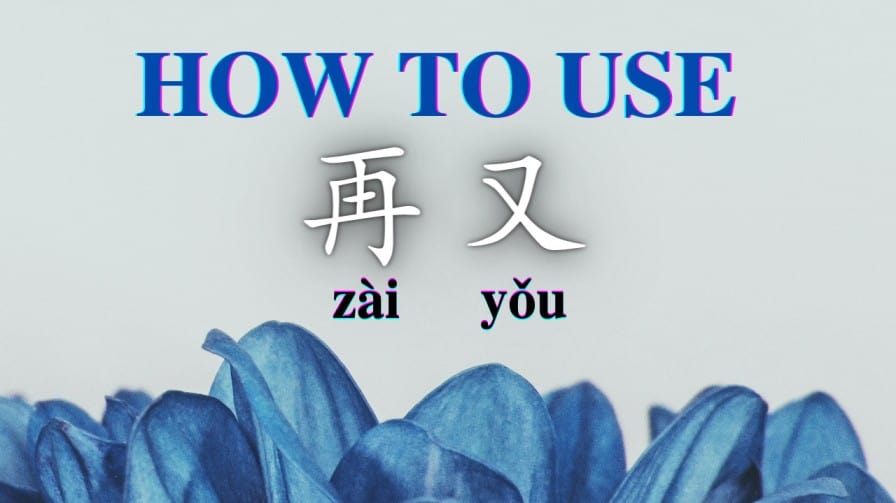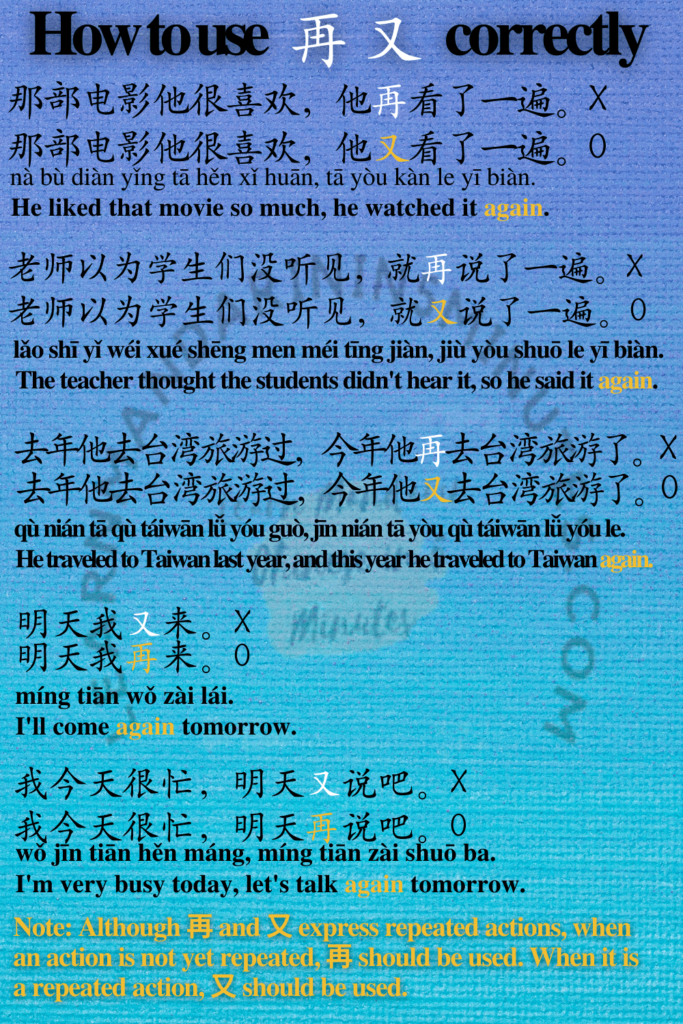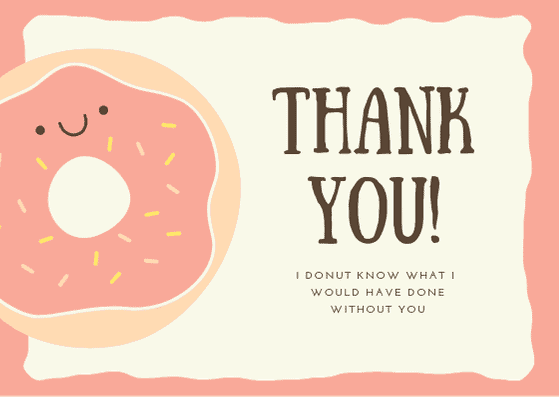In this post, we are going to learn how to use the Chinese 再 zài and 又 yòu. Although Chinese 再zài and 又 yòu expresses a repetition of an action or continuation of a state, there are some differences in their usage.
Chinese character 再 zài
The Chinese character 再 zài in English is again, once more and another. It is a HSK level 1 Chinese word. The radical is 冂 if searching for this Chinese word in a Chinese dictionary.
The Chinese character 又 yòu
The Chinese word 又 yòu has a similar meaning in English as 再 zài. This Chinese character also means again, as well as also, but … and…. 又 yòu is a HSK Level 3 Chinese word. Radical to look for in the Chinese dictionary is 又.
How to use Chinese 再 zài and 又 yòu

https://youtu.be/8fX0x2-1YqQ
1. Expressing repeated or continuation of an action
When you are referring to a repeated action , you must use 又 yòu
他又去图书馆了。Tā yòu qù tú shū guǎn le.
He went to the library again.
你又说同样的话。nǐ yòu shuō tóng yàng de huà.
You said the same thing again.
明天又是星期天了。 Míng tiān yòu shì xīng qí tiān le
Tomorrow is Sunday again.
Unlike 又 yòu, 再 zài states an action that has yet to be repeated.
老师要他再去图书馆温习功课。
Lǎo shī yào tā zài qù tú shū guǎn wēn xí gōng kè.
The teacher wants him to go to the library to revise his homework again.
This sentence means he might have gone to the library yesterday but not today, so the teacher wants him to go to the library again.
请再说一遍好吗?qǐng zài shuō yī biàn hǎo ma?
Could you say it again?
老师已经走了,你们明天再来吧。
Lǎo shī yǐjīng zǒu le, nǐ men míng tiān zài lái ba.
The teacher has already left, come back again tomorrow.
2. Using 不 in a 再 zài and 又 yòu sentence
When using 不 bù in a 又 yòu sentence, 不 can be before 又 but not after. This indicates a re-occurrence of an action.
彼得又不吃菜了。Bǐdé yòu bù chī cài le
Peter is not eating his vegetables again.
This is a sentence stating that Peter does not like to eat vegetables and always avoid eating it.
It is incorrect to say 彼得不又吃菜了 in a declarative sentence. However, if it is a rhetorical question, it is ok to put 不 before 又. 彼得不又吃菜了 means Peter is eating his vegetables again.
这个字你又不记得怎么写了。
Zhè ge zì nǐ yòu bù jì dé zěn me xiě le.
You have forgotten how to write this word again.
When using 不 bù in a 再 zài sentence, 不 can be before and after 再.
我以后再也不来你家了。
Wǒ yǐ hòu zài yě bù lái nǐ jiā le.
I will never come to your house again.
他不再是个听话的孩子。
Tā bú zài shì gè tīng huà de hái zi.
He is no longer an obedient child.
3. Using 又 yòu before an adjective
When using 又 yòu before an adjective, it indicates a parallel relationship.
他很高,又壮。Tā hěn gāo, yòu zhuàng.
He is tall and strong.
Using 又 before 壮 is stating a parallel relationship with 高. It is not stating a repeated action.
她又漂亮又懂事。 Tā yòu piào liang yòu dǒng shì
She is beautiful and sensible.
The adjectives used in this structure must be both positive or both negative in meaning. They cannot be the opposite of each other.
4. Using 再 zài before an adjective
When using 再 zài before an adjective, there are two ways of using this Chinese adverb.
First usage:-
去上海的火车只有两点的,再早一点(儿)的没有了。
Qù shànghǎi de huǒ chē zhǐ yǒu liǎng diǎn de, zài zǎo yī diǎn (er) de méi yǒu le.
There are only 2 o’clock trains to Shanghai, no earlier ones.
再早 means earlier than 2 o’clock and not early again.
Sentence structures like these usually have measurement words such as 一些 yī xiē or 一点儿 yī diǎn er after the adjective.
2nd usage to mean no matter how 无论多么 wú lùn duō me
这面再好吃,天天吃也会腻。
zhè miàn zài hǎo chī, tiān tiān chī yě huì nì.
No matter how delicious this noodle is, you will get sick of it if you eat it every day.
他是个大胃王,吃再多也不会饱。
Tā shì gè dà wèi wáng, chī zài duō yě bù huì bǎo.
He is a big eater, no matter how much he eats, he will never be full.
5. 又 yòu sometimes expresses a specific meaning
This sentence structure has three different usages.
First usage has the meaning of but or however in English
这面包吃了会很饱,不吃又浪费。
zhè miàn bāo chī le huì hěn bǎo, bù chī yòu làng fèi
I will be very full if I eat this bread, but if I don’t it is a waste.
又 does not mean wasting food again. It has the meaning of but or however in English.
彼得显得闷闷不乐,问他是不是有心事,他又不说。
bǐdé xiǎn de mèn mèn bù lè, wèn tā shì bù shì yǒu xīn shì, tā yòu bù shuō.
Peter seems unhappy, but when I asked him what is bothering him, he refused to say anything.
又 does not mean Peter not saying again. It has the meaning of but in English here.
These 2 sentences is equivalent to 却 què, which is but or however in English. You can substitute 又 with 却. For example, 彼得显得闷闷不乐,问他是不是有心事,他却不说。
Second usage means more than once
白衬衫沾了酱汁,妈妈洗了又洗,终于把酱汁洗掉了。
bái chèn shān zhān le jiàng zhī, māma xǐ le yòu xǐ, zhōng yú bǎ jiàng zhī xǐ diào le.
My mom washed the stained white shirt a few times, and finally got rid of the stain.
洗了又洗 means washing a few times and not just once.
3rd usage is just to enhance the tone of voice without any special meaning
你怕这小狗干嘛,它又不会咬你。
nǐ pà zhè xiǎo gǒu gàn ma, tā yòu bù huì yǎo nǐ
Why are you afraid of this puppy, it won’t even bite!
再 zài does not have the three usages like 又 yòu , but when placed at the end of a few similar verbs, it has the meaning of continuation or un-interruption. For example,
我们必须努力,努力,再努力。
Wǒ men bì xū nǔ lì, nǔ lì, zài nǔ lì.
We must work hard, work hard and work harder.
再 means continuation or un-interruption and not again.

Exercise
Fill in the blanks with 再 zài or 又 yòu.
时间过得真快,明天________是星期五了。Shí jiān guò dé zhēn kuài, míng tiān shì xīng qí wǔ le.
Time flies so fast, tomorrow is Friday again.
我今天很忙,明天_________说吧。 Wǒ jīn tiān hěn máng, míng tiān shuō ba
I am busy today. let’s talk again tomorrow.
明天我 __________ 来。míng tiān wǒ lái.
I will come again tomorrow.
我 ___________ 来了。Wǒ lái le.
I am here again.
Leave you answers in the comment section.
If you find this post useful, do share with your friends who are learning Chinese as well. For video presentation of this post, please click here.
